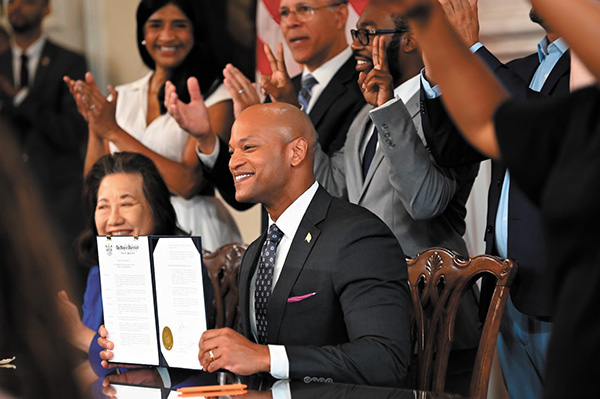Black Community Opinions
Gov. Moore’s Cannabis Pardons Applauded By NAACP, Lawmakers
Maryland Governor Wes Moore’s historic executive order pardoning 175,000 residents with low-level cannabis convictions is being celebrated by the NAACP and lawmakers, marking a significant step in addressing the racial injustices of past drug policies.
#WesMoore #CannabisPardons #CriminalJusticeReform #NAACP #RacialJustice #DrugPolicyReform

By Rosaland Tyler
Associate Editor
New Journal and Guide
While it is impossible to calculate the number of Black lives that have been ruined by a cannabis conviction, it is possible to add up the number of Black lives that Maryland Gov. Wes Moore may have improved when he recently signed an executive order that pardons 175,000 Maryland residents with low-level cannabis convictions.
According to the website for Gov. Moore, “The order represents the largest pardon for misdemeanor cannabis possession charges for any state in the country.” The order also pardons paraphernalia possession. The historic executive order not only made Maryland the first state to take such action, it prompted multiple political and civic leaders to express their gratitude to Gov. Moore.
In fact, you can read a long list of tributes to Moore on his official website. The long list of tributes includes comments from local, state and federal government leaders, who not only congratulated Moore but explained how the order will help many.
For example, Maryland Attorney General Anthony G. Brown pointed to how cannabis convictions have denied jobs, housing and education to cannabis offenders.
“The enforcement of cannabis laws has disproportionately and overwhelmingly burdened communities of color. Opportunities were denied because those who were convicted faced steep obstacles to jobs, education, and housing,” Brown said in a recent statement on the website for Gov. Moore.
Others applauded Moore’s recent June 17, 2024 executive order including NAACP President and CEO Derrick Johnson, who said in a statement after Maryland’s first Black governor signed and issued the historic executive order, “The NAACP has long known that the War on Drugs was a war on Black America. As we move away from the regressive policies of the past, it’s crucial that our leaders assist in building new futures for those impacted. For decades, communities of color have been torn down by the hands of injustice and imprisoned at disproportionate rates due to discriminatory policies.”
The NAACP added in a statement on its website, “The Governor’s brave decision to pardon these 175,000 Americans will provide them with a new-found ability to attain opportunity. We will continue to advocate for, and applaud all policy reforms that repair injustices inflicted on our community. As we celebrate today, we look toward tomorrow, pushing for similar policies across the nation. Together, we will mold a future that shines a light over the darkness of our nation’s past.”
Others who celebrated Gov. Moore’s recent executive order include University of Baltimore School of Law Center for Criminal Justice Reform Executive Director Heather Warnken, who said, “This courageous action by Governor Moore is an important piece of a much bigger puzzle of addressing the devastating drug war which disproportionately harmed, and continues to harm, marginalized Black and brown communities. We celebrate this historic win and look forward to partnering with the administration on the work ahead.”
Baltimore City Mayor Brandon M. Scott said, “We still see and feel the wounds every day in the lives, families, and communities that were disrupted and destroyed. Today’s action to pardon these more than 175,000 convictions is a step towards healing. For those receiving the pardons – which includes thousands upon thousands of Baltimoreans – it will be life changing.”
Moore’s executive order also directs the Department of Public Safety and Correctional Services to develop a process to indicate on an individual’s criminal record that the conviction was pardoned. This process is expected to take approximately 10 months to complete.
Individuals do not need to take any action to receive the pardon. After the Judiciary updates the electronic dockets to reflect the pardon, a process that should take approximately two weeks, individuals can check online or at a public kiosk at any courthouse in the state to verify whether they were included in the pardon.


 Entertainment1 week ago
Entertainment1 week agoHoliday Film On Lifetime Penned By HBCU Alum

 Tech1 week ago
Tech1 week agoThe Digital Download: The Twelve Days of Christmas

 Book Reviews7 days ago
Book Reviews7 days agoBook Review: Stitching Freedom: A True Story of Injustice, Defiance, and Hope in Angola Prison

 HBCU2 days ago
HBCU2 days agoFormer NFLers Vick And Jackson Drive 2025 HBCU Attendance Surge

 Black History1 day ago
Black History1 day agoEmancipation Observances Began In 1863 Norfolk & S.C.

 Black Business News11 hours ago
Black Business News11 hours agoBeyoncé Enters Billionaire Ranks Few Black Americans Have Reached
















